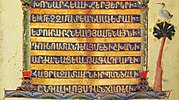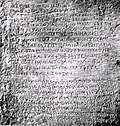Parthian Language Attestations
Parthian Language Attestations - Search results - Wiki Parthian Language Attestations
The page "Parthian+Language+Attestations" does not exist. You can create a draft and submit it for review or request that a redirect be created, but consider checking the search results below to see whether the topic is already covered.
- the Parthian power, play an important role for reconstructing the Parthian language. Those Manichaean manuscripts contain no ideograms. Attestations of...
- most of Media. A number of modern Iranian languages spoken today have had medieval stages with attestations found in Classical and Early Modern Persian...
 Hittite (natively: 𒌷𒉌𒅆𒇷, romanized: nešili / "the language of Neša", or nešumnili / "the language of the people of Neša"), also known as Nesite (Nešite/Neshite...
Hittite (natively: 𒌷𒉌𒅆𒇷, romanized: nešili / "the language of Neša", or nešumnili / "the language of the people of Neša"), also known as Nesite (Nešite/Neshite... Romance. The vocabulary of the language has historically been influenced by Western Middle Iranian languages, particularly Parthian; its derivational morphology...
Romance. The vocabulary of the language has historically been influenced by Western Middle Iranian languages, particularly Parthian; its derivational morphology...- backward the first attestation of certain languages. It also does not include inscriptions consisting of isolated words or names from a language. In most cases...
 Arabic (redirect from Arabic (language))and political terms have entered Arabic from Iranian languages, notably Middle Persian, Parthian, and (Classical) Persian, and Hellenistic Greek (kīmiyāʼ...
Arabic (redirect from Arabic (language))and political terms have entered Arabic from Iranian languages, notably Middle Persian, Parthian, and (Classical) Persian, and Hellenistic Greek (kīmiyāʼ...- ancestor from descendant is arbitrary. For many languages which have become extinct in recent centuries, attestation of usage is datable in the historical record...
 Assyrian people (category CS1 Swedish-language sources (sv))semi-autonomous Assyrian vassal states (Assur) sprung up in the east under Parthian rule, lasting until conquests by the Sasanian Empire in the region in the...
Assyrian people (category CS1 Swedish-language sources (sv))semi-autonomous Assyrian vassal states (Assur) sprung up in the east under Parthian rule, lasting until conquests by the Sasanian Empire in the region in the...- Old Persian (redirect from Old persian language)group such as Avestan, Parthian, Soghdian, Kurdish, Pashto, etc., Old, Middle and New Persian represent one and the same language at three states of its...
 between Proto-Indo-European and the earliest attestations of Classical Armenian. It is thus not a proto-language in the strict sense, but "Proto-Armenian"...
between Proto-Indo-European and the earliest attestations of Classical Armenian. It is thus not a proto-language in the strict sense, but "Proto-Armenian"...- Aramaic (redirect from Aramaic language)Iranian languages, including Parthian, Middle Persian, Sogdian, and Khwarazmian. Some variants of Aramaic are also retained as sacred languages by certain...
- Persians (category Articles containing Ancient Greek (to 1453)-language text)not yet have a political import. The Parthian language, which was used as an official language of the Parthian Empire, left influences on Persian, as...
 Kambojas (redirect from Language and ethnicity of Kambojas)Edicts of the Maurya emperor Ashoka (r. 268–232 BCE) contain the first attestations of the Kambojas that can be precisely dated. The thirteenth edict says...
Kambojas (redirect from Language and ethnicity of Kambojas)Edicts of the Maurya emperor Ashoka (r. 268–232 BCE) contain the first attestations of the Kambojas that can be precisely dated. The thirteenth edict says... Middle Persian (redirect from Pahlavi language)The Persians called their language Parsig, meaning "Persian". Another Middle Iranian language was Parthian, i.e. the language of the northwestern Iranian...
Middle Persian (redirect from Pahlavi language)The Persians called their language Parsig, meaning "Persian". Another Middle Iranian language was Parthian, i.e. the language of the northwestern Iranian...- Khosrow (word) (category Articles containing Parthian-language text)This is the oldest attestation. The name was used by various rulers of Parthian Empire. It has been attested in Parthian-language inscriptions as "hwsrw"...
- Karkar (ancient city) (category CS1 German-language sources (de))the Ur III and Old Babylonian periods mention Karkar, in later times attestations are limited to literary texts, and it is not certain if the city continued...
 Linguistic history of India (redirect from Ancient Indian language)The earliest epigraphic attestations of Tamil are generally taken to have been written shortly thereafter. Among Indian languages, Tamil has one of the...
Linguistic history of India (redirect from Ancient Indian language)The earliest epigraphic attestations of Tamil are generally taken to have been written shortly thereafter. Among Indian languages, Tamil has one of the... Chaldea (redirect from Ancient Chaldean language)Medes, Persians, Sagartians and Parthians, into a large and powerful Median-dominated force. The Medes, Persians, Parthians, Chaldeans and Babylonians formed...
Chaldea (redirect from Ancient Chaldean language)Medes, Persians, Sagartians and Parthians, into a large and powerful Median-dominated force. The Medes, Persians, Parthians, Chaldeans and Babylonians formed... and Parthian on the other: it is thus in its natural and rightful place in Bactria". Waghmar, Burzine K. (2001) 'Bactrian History and Language: An Overview...
and Parthian on the other: it is thus in its natural and rightful place in Bactria". Waghmar, Burzine K. (2001) 'Bactrian History and Language: An Overview... Mithridates II of Parthia (category Articles containing Parthian-language text)II (also spelled Mithradates II or Mihrdad II; Parthian: 𐭌𐭄𐭓𐭃𐭕 Mihrdāt) was king of the Parthian Empire from 124 to 91 BC. Considered one of the...
Mithridates II of Parthia (category Articles containing Parthian-language text)II (also spelled Mithradates II or Mihrdad II; Parthian: 𐭌𐭄𐭓𐭃𐭕 Mihrdāt) was king of the Parthian Empire from 124 to 91 BC. Considered one of the...
- allegiance to the Parthian monarchs, but the little state enjoyed most of the conditions favourable for independent literary development. The language of the people










